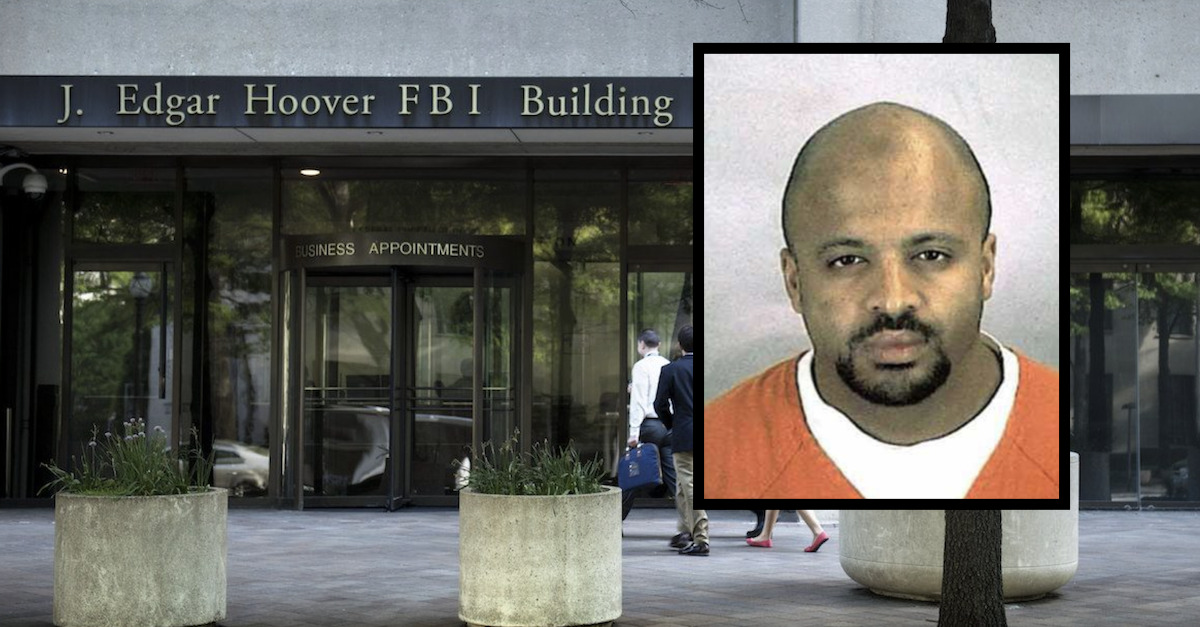
A mugshot of 9/11 plotter Zacarias Moussaoui appears set against an image of the J. Edgar Hoover FBI Building in Washington, D.C.
The U.S. Department of Justice is illegally blocking the release of a memoir written by a former FBI agent whose work was instrumental in bringing one of the terrorists responsible for 9/11 to justice, according to a lawsuit filed in federal court on Monday afternoon.
Harry Samit is a 20-year veteran of the bureau. In the aftermath of the attack on the World Trade Center, the then-special agent led investigations based out of the Minneapolis Field Office that resulted in the capture of French al-Qaeda member, Zacarias Moussaoui, the only person ever convicted in a U.S. court for the 9/11 attacks.
The 9/11 plotter is currently serving a life sentence in a federal Supermax prison in Colorado.
Now, in the book, “Because There Are Monsters,” Samit, who retired in 2020, would like to tell his stories. But the Biden administration’s DOJ, by way of Samit’s former employer, is not allowing him to do so.
The 13-page petition was filed in the U.S. District Court for the District of Columbia by national security and whistleblower attorney Mark Zaid. The lawsuit alleges that the DOJ and the FBI have failed to timely review the manuscript – punting on the issue for nearly two years and stifling access to necessary information.
The lawsuit alleges, however, that there is no classified information contained in the manuscript at all. The filing claims the DOJ and FBI are infringing on Samit’s First Amendment rights “by improperly redacting information and failing to timely complete its prepublication classification review.” The lawsuits calls this an unlawful “prior restraint.”
The 852-page manuscript was submitted to the FBI for prepublication classification review on April 1, 2021, the lawsuit says.
The book is described as “a true crime/intelligence memoir describing Samit’s first nine years assigned to the Minneapolis Joint Terrorism Task Force” as well as a brief bit of backstory on Samit himself. The overarching narrative, however, begins in 1999, after the author obtained special agent status, the filing explains, and “discusses unclassified details regarding a number of investigations, both terrorism and non-terrorism, that will catch the reader’s attention.”
After acknowledging receipt of the manuscript on April 6, 2021, the lawsuit complains, the FBI’s review pace has been glacial – with completion estimates repeatedly pushed back and no end in sight.
At first, the FBI Prepublication Review Office told Samit they “estimated that consultations and research during the review process would take approximately 120 – 180 business days.” Those deadlines have since whooshed right on by.
The next month, the office said “a couple of pages” would have to be subject to deletions and editing. In December of last year, the office said they could not provide “a closure date at this time.” Fast-forward to mid-September of this year and the result was not much better for the beleaguered author. A message from the office notes: “Prepublication review has been finalized for your first interim release for pages 1-400 or the first two parts of your manuscript.”
Citing the “exceptionally lengthy” nature of the manuscript and alleged “information on various sensitive matters,” the office has yet to review, or at least acknowledge review, over half of the book.
“Until such time as Samit receives final approval from DOJ/FBI or authorization from this Court, he is restricted by his past secrecy agreements and statutes from disseminating the unreviewed portions of his Manuscript,” the lawsuit says. “Upon being informed by DOJ/FBI of the existence of alleged classified information within his Manuscript, Samit is prohibited from drafting any substantive responses that knowingly contain the challenged classified information and he will need access to a secure, stand-alone government computer to provide any arguments specifically as part of this lawsuit.”
The filing contains three distinct causes of action under the First Amendment seeking declaratory judgments giving Samit the right to publish his tell-all book, confer with his attorneys and a court of law, and to access a secure government computer to construct his legal case.
The lawsuit alleges, at length:
DOJ/FBI has failed to show that Samit’s First Amendment right to publish unclassified information is outweighed by the government’s interest in efficiently carrying out its mission by minimizing harms that are real, not merely conjecture.
DOJ/FBI has failed to demonstrate the existence of substantial government interests that would enable it to prohibit the publication of unclassified information within Samit’s Manuscript.
DOJ/FBI’s restrictions imposed upon Samit have been unduly vague and were not narrowly confined to avoid infringement of his First Amendment rights to publish unclassified information. They have unnecessarily restricted unclassified speech that does not serve to protect any substantial government interest.
There is also one cause of action under the Administrative Procedure Act of 1946 for “unreasonable delay.”
“Samit’s lawsuit is another example demonstrating the federal prepublication review system is broken,” Zaid said in a statement provided to Law&Crime. “While we understand government reviews require time, taking more than 18 months is unacceptable, especially regarding a topic as important as the 9/11 attacks on our country. This manuscript will reveal previously unknown details regarding the 20th hijacker – the only individual directly tied to 9/11 who was stopped – that the American public deserves to know. It is unfortunate it requires judicial intervention to ensure that happens.”
[images: FBI Building via BRENDAN SMIALOWSKI/AFP/Getty Images; Zacarias Moussaoui Department of Homeland Security]